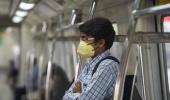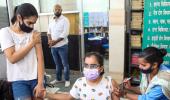India's effective reproduction number (R) for Covid, an indicator of how quickly the infection is spreading, has increased to over one for the first time since January, estimates a researcher from Chennai's Institute of Mathematical Sciences.

The country's R-value, steadily increasing over the last few weeks, is 1.07 for the week between April 12-18, according to Sitabhra Sinha. In the preceding April 5-11 week, it was 0.93.
The last time the R-value was above 1 was in the week between January 16-22, when the value was 1.28, Sinha said.
"This increase in R-value is not just because of Delhi but also Haryana and Uttar Pradesh," the mathematician, who has been tracking the R number for India since the beginning of the pandemic, told PTI in an email interview.
An R-value of over 1 indicates that the number of active cases has increased. R should be contained below 1 to control the pandemic. An R number lower than 1 indicates that the disease will stop spreading as there aren't enough people being infected to sustain the outbreak.
“The total cases in India are indeed increasing exponentially. Of course, this being a very large country, this national rise is primarily being driven by a few regions - one cluster in the north (Delhi, Haryana, UP) and the other in the south (Karnataka),” Sinha said.
"It is interesting that the major cities of Mumbai, Chennai and Bengaluru also have R above 1, suggesting that urban areas may be showing an increasing number of cases even though at the level of the entire state such an increase may not yet be apparent,” he noted.
Delhi and Uttar Pradesh have an R-value above 2. Data for Kolkata was not available, Sinha said.
The estimated R-value in the week ending April 18 is 2.12 for Delhi, 2.12 for Uttar Pradesh, 1.04 for Karnataka, 1.70 for Haryana, 1.13 for Mumbai, 1.18 for Chennai and 1.04 for Bengaluru.
Among the major states, Kerala and Maharashtra have an R-value less than 1, with values of 0.72 and 0.88 respectively.
Karnataka also has R over 1 currently, possibly because of the rising cases in Bengaluru, Sinha explained.
“The value for India we have estimated at the present is roughly what the R-value was (1.08) between February 14-March 11 last year - i.e., just before the onset of the second wave in India when it rose to 1.37 on March 9-April 21, 2021, before decreasing to 1.10 (April 29-May 7) and finally decaying to values below 1 by May 9 (R: 0.98).
“At the height of the Omicron wave R had risen to its maximum value so far (for India) of 2.98 (December 30, 2021-Jan 10, 2022). Contrast this with the next highest value of R during the beginning of the first wave, 2.51 (March 14-April 5, 2020),” he added.
Asked about the implications of the increase in R-value for Covid trajectory, Sinha said “it can go either way”.
“Going forward, whether this leads to another huge increase in cases depends on prompt actions taken by the public at large which seems to have stopped adopting basic precautions like wearing masks and avoiding crowds,” he added.
“We need to again insist that everyone wears masks, practice basic hygiene (like washing hands and avoid touching one's face,eyes), physical distancing as much as possible, etc.”
With 2,067 new coronavirus infections being reported in a day, India's total tally of COVID-19 cases rose to 4,30,47,594 (4.3 crore) while active cases increased to 12,340, according to the Union Health Ministry data updated on Wednesday.
An increase of 480 cases has been recorded in the active COVID-19 caseload in a span of 24 hours. The daily positivity rate was recorded at 0.49 per cent and the weekly positivity rate was recorded at 0.38 per cent, according to the health ministry.
On Tuesday, Delhi recorded a nearly 26 per cent jump in fresh Covid cases but positivity rate dropped to 4.42 per cent, according to data shared by the city health department on Tuesday. While 632 fresh Covid cases were reported, the positivity rate was 4.42 per cent. The city had on Monday recorded 501 cases and zero death while the positivity rate stood at 7.72 per cent.










 © 2025
© 2025